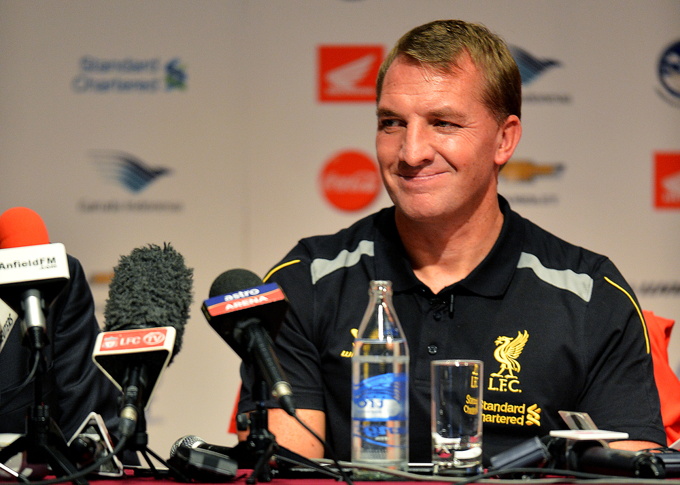Brendan Rodgers: For & Against
The season is over and, whichever way you look at it, it’s been a disappointing one for Liverpool Football Club. It means that John W. Henry, Tom Werner and those at the top of the food chain at Fenway Sports Group have a decision to make: should Brendan Rodgers stay or go?
It’s not an easy question to answer. There are plenty of opinions from either side of the aisle and most of them are not without merit. Perhaps, if they were really stuck, they might sit down and pen a ‘for and against’ charter regarding the Irishmen and see which one they thought out-weighed the other.
That’s why we decided to take the hard work out of it for them and write down what we felt were the salient points both for and against Brendan Rodgers, the man, the myth, the manager.
Obviously if you think we’ve missed anything glaring off the list, or you disagree entirely, then let us know in the comments section. We’re keen to get as much interaction as possible so don’t be shy!
FOR:
He’s Innovative
4-3-3 diamond; 3-5-2; inverted pyramids. Rodgers doesn’t like standard formations. He’s not a boring manager. Say what you like about him, but he’s not afraid to try something new. For some managers the notion of having a ‘plan B’ means sticking on a six foot seven inch striker built like a brick outhouse and lumping it up to him. For others it means pushing a central defender into the striker’s berth and hitting and hoping.
For Brendan Rodgers ‘plan B’ means switching from four at the back to three, with two wingbacks pushing so far forward they’re virtually on the halfway line. It means playing a midfielder as a right back and getting him to push into the central positions when the team is in possession.
There are a section of supporters who might want to put this into the ‘against’ column, but surely the Rickie Lambert experiment this season has shown that lumping it up to the big man isn’t a winning formula. It might work for the likes of Stoke or a Tony Pulis team, but Liverpool aren’t a squad built on the idea of crossing it in and hoping for a player to out-muscle the defence.
Liverpool Football Club has always been built on the idea of a passing game; quick movement from the front men, players who change position at the drop of a hat, constantly moving around and trying to bamboozle the opposition’s defence. An out and out target man doesn’t work with that philosophy and Rodgers knows it. He’s tactically innovative – and that can only be a good thing.
He’s A Man Manager
Rodgers’s critics are quick to claim that Luis Suarez was the sole reason that Liverpool were involved in the title race in 2014. But that claim ignores the fact that Suarez signed for Liverpool in January 2011. He played for a season and a half under Kenny Dalglish and another full season under Brendan Rodgers without Liverpool even looking like challenging at the top.
Let’s look at his league scoring record during his time at Liverpool:
| Manager | Games | Goals |
|---|---|---|
| Dalglish | 13 | 4 |
| Dalglish | 31 | 11 |
| Rodgers | 33 | 23 |
| Rodgers | 33 | 31 |
Sufficed to say his goal scoring exploits exploded under Rodgers. From double the goals in Rodgers’s first season to triple the goals in his second – when compared to Dalgish’s only full season as boss – that’s an incredible improvement. You’d have to be a real cynic to suggest that none of that is down to Rodgers.
Suarez himself said, “Liverpool are in very good hands with Brendan Rodgers. The way he coached us during my time there was impressive and I am sure that the methods I enjoyed and found so effective will continue to be employed”.
That line is in Suarez’s autobiography, Crossing The Line, and there’s another story about the run-in last season in the book that speaks to Rodgers’s man management ability. He said:
“Brendan Rodgers had been delivering very special team talks. He had contacted our mothers, one by one, and asked them to write something about their son. Before every game as we went on the run which saw us come so close to winning the title, he would spend the final few minutes before we went out reading what one of them had said in front of the whole team. The final word came not from the manager but a player’s mum.”
Some might think that to be soft, but you can’t claim it didn’t work as Liverpool won eleven games in a row at the end of the season to take them incredibly close to an unlikely title. In fact, they took the title challenge to the last day – something no Liverpool team has done in the Premier League era.
Whatever you may think of Rodgers as a manager, there’s no questioning his ability to get the best out of his players, to get them to push themselves that little bit further and harder.
There are a host of stories about how nice a guy Brendan Rodgers is, about how he wants to help players be the best that they can be. We’ll let Steven Gerrard have the last word on this point:
“He is a players’ manager, a manager you want to work hard for and win for. He shows the players unbelievable respect; he treats them like his own children and creates an unbelievable atmosphere to work in. I have been blown away by how sharp he is in the dressing room, how quick he is to see a problem.”
Good enough for Suarez, good enough for Gerrard. Who are we to disagree?
He Has A Great Success Rate
Since 1990 Liverpool FC have had five managers who have had three seasons or more in charge. Thankfully that means we don’t need to talk about Roy Hodgson, as the less said about him the better.
Here’s the amount of games each manager was in charge for alongside the amount of points they won and their average points per game:
| Manager | Games | Points Won | Av. Points Per Game |
|---|---|---|---|
| Souness | 126 | 183 | 1.45 |
| Evans | 118 | 213 | 1.80 |
| Houllier | 116 | 190 | 1.63 |
| Benitez | 116 | 208 | 1.79 |
| Rodgers | 114 | 207 | 1.81 |
Statistically, then, Rodgers is the most successful manager Liverpool have had during the Premier League era.
What about when we compare him to Liverpool’s other successful managers? This is based on the idea of there being three points per win:
| Manager | Games | Points Won | Av. Points Per Game |
|---|---|---|---|
| Shankly | 609 | 1109 | 1.82 |
| Paisley | 378 | 735 | 1.94 |
| Fagan | 84 | 157 | 1.86 |
| Dalglish (1st time) | 280 | 549 | 1.96 |
So there you have it. Nearly as successful as Shankly but not quite up there with the managers who made Liverpool the footballing powerhouse they were in the 70s and 80s. Not bad, all things considered.
Of course his critics would point out that if you added another column – trophies won – on to the end of the table then things wouldn’t look quite so rosy for Rodgers, but surely if he’s allowed to carry on with his current points per game ratio then trophies would be just around the corner? More on that in the ‘Against’ column.
He’s Forward Thinking
Dr Steve Peters is one of the chief reasons given for why the British Cycling Team has done so well in recent Olympics and European Championships. Ronnie O’Sullivan, the snooker player, has worked with Peters for years and claims he’s one of the main reasons he’s still playing the game, despite numerous threats to retire.
Peters, if you don’t know, is a psychiatrist who specialises in sports psychology. He was brought to Liverpool by Brendan Rodgers in order to help with the mental side of the game, and plenty of players have taken advantage. Steven Gerrard said of him, “Steve Peters is not going to make the players run 100 metres any quicker, although he is a former sprinter himself, or do a Cruyff turn better or hit a 40-yard pass any more accurately. But what I can guarantee is that if the players buy into it, he’ll be able to help them with mental preparation and make them understand how the mind works, especially when you’re going into pressure situations”.
Rodgers is all about looking at new ways of achieving things; of getting whatever edge he can over his opponents. If bringing in Steve Peters can help Liverpool win high-pressure matches then it’s an avenue the Liverpool manager thinks is worth exploring. That’s the sort of forward thinking that should be applauded. After all, how many people questioned it when the first managers started to observe what food the players ate?
He Fits The FSG Model
Since they arrived at Liverpool Fenway Sports Group have been very clear that they plan to obey the rules of Financial Fair Play, and they hope to pressure UEFA into ensuring that everyone else obeys it rigorously too.
They aren’t going to splash the cash around Anfield, whatever the fans may hope from them. They aren’t going to plough money into the club in the same way that the Abu Dhabi Group have at Manchester City, so the only real hopes of Liverpool succeeding against the odds is to find a different way of doing things.
FSG want to invest in youth; from young players like Raheem Sterling and Jordan Ibe through to a young, intelligent manager that will look for alternative ways to win, the American group believe that they aren’t going to succeed in the Premier League by doing the same old thing as everyone else.
Managers like Carlo Ancelotti, Guus Hiddink and even Rafa Benitez are unquestionably talented, but they aren’t the sorts of managers that can find a way to do things in an unconventional manner. The fact that they’re after someone different from the norm can also be seen in their decision to remove Kenny Dalglish from the Anfield hot seat. After all, in his final season he won the League Cup and took the Reds to the FA Cup final, even if his team’s league form suffered because of it.
Look at the people that FSG were reportedly interviewing for the manager’s position once they got rid of Dalglish: André Villas-Boas, Roberto Martinez and Jurgen Klopp were all either interviewed or ruled out before FSG decided to appoint Rodgers. All of them are from the younger, more exciting school of management that FSG believe can give Liverpool the edge in an increasingly difficult and competitive league.
In fact, were they to remove Rodgers from the manager’s position then the likelihood is they’d be looking for the next Brendan Rodgers, and who is better at that than the current Brendan Rodgers?
A lot of Liverpool fans seem convinced that if Rodgers were to pack up his Melwood office then FSG would look to replace him with someone like the aforementioned Klopp, or perhaps they’d interview Benitez – something they failed to do before appointing the Irishman in 2012.
Yet the likelihood is that they would explore more off-the-wall avenues, such as the man who replaced Rodgers at Swansea, Gary Monk. Would those wanting rid of Rodgers be quite as keen for him to go if they knew he’d be replaced not with a manager of the pedigree of Klopp or Benitez, but instead with the up and coming Monk?
Whatever you may think of Rodgers, there’s no question that he’s exactly the sort of manager FSG believe will help Liverpool escape the malaise they’ve suffered from in recent years. So why look for the next best thing when you’ve got the best version of Rodgers there is?
There Are Mitigating Circumstances
In the 2013-2014 season Luis Suarez scored 31 league goals. Daniel Sturridge, who would have been player of the season virtually any other year, chipped in with 21.
When Luis Suarez was sold to Barcelona it was clear Liverpool would struggle to match their same goal-scoring feats, but it was assumed that Sturridge would step up to the plate and take on the goal-scoring mantel.
Sturridge’s injuries throughout the 2014-2015 season, then, left Brendan Rodgers without his main striker, the man that the team was going to be built around. Of course the club failed to replace Suarez adequately, and the transfer dealings during the summer are something that will be looked at in the ‘Against’ column.
However, losing 52 league goals from the team was never going to be easy to cope with. There is no manager in the league who could deal with losing that many goals and be expected to see his team perform to the best of their ability.
Many will criticise the signing of players like Balotelli and Lambert, yet the Italian was surely brought in to play alongside Sturridge, not instead of him. Indeed, most consider Liverpool’s best performance of the season to be the 3-0 victory away at Spurs; a game in which Sturridge and Balotelli played alongside each other. True Super Mario wasted a number of great opportunities, but it was his first game for the club so that can be excused.
Liverpool nearly won the league by scoring over 100 goals in Rodgers’s second season in charge. Whatever you may think of Rodgers, losing the main men who brought the majority of those goals to the club was a huge dent in the side of Rodgers’s ambitions for last season, and one that surely has to go down as a reasonable mitigating factor.
AGAINST:
He Talks Too Much
The truth is that a lot of the criticism levelled at Brendan Rodgers is personal. We’ll talk about that more later on in the ‘There’s Just Something About Him’ section. Yet one of the biggest problems a lot of people seem to have with him is that he is extraordinarily loquacious.
Speaking after matches he is prone to say that Liverpool played “exceptionally well”, regardless of the actual performance. Not long after becoming Liverpool manager he earned a reputation as being similar to David Brent, due to his somewhat bizarre and occasionally cringe worthy quotes.
Things such as, “My biggest mentor is myself because I’ve had to study, so that’s been my biggest influence”, or “You train dogs, I like to educate players” and, “The problem with being a manager is it’s like trying to build an aircraft while it is flying”; these are quotes that leave people feel their toes curl up in their shoes.
Perhaps taking over at Liverpool at a time that the American company Fox Soccer decided to make a documentary called “Being Liverpool” didn’t help him. The fly-on-the-wall documentary, which took viewers behind the scenes as Rodgers took over at Liverpool, didn’t paint the young manager in the best light, and some fans have never been able to get over the image of Rodgers they took from the show.
Perhaps it’s because he sometimes feels the need to justify his position as the manager of a club like Liverpool – something that is mildly understandable when you consider the constant pressure and criticism he’s subjected to. He will talk for hours about the way he uses his formations, how he decided to invert the diamond or shift players around in order to unlock a difficult defence, for example.
It’s not an altogether fair criticism that he is friendly and open with the press, especially when you consider that Kenny Dalglish was disparaged for being too prickly with those same scribes when he was the manager.
He is sometimes referred to as being like a footballing salesman, flogging his snake oil to those foolish enough to buy into it. It’s not easy to convince people you’re the real deal when you haven’t got a decent record to fall back on, and there are vast swathes of Liverpool fans that remain unconvinced – despite last year’s title challenge. To them, every word that leaves Rodgers’s mouth is nonsense.
Maybe it’s fair, maybe it’s not, but until and unless Brendan Rodgers is able to lift a trophy with Liverpool he will continue to sound like he is attempting to convince the Anfield faithful that he is the right man for the job, and that is never likely to be a winning formula.
He Hasn’t Won Anything
OK, that’s not technically true as he did win the Play-Off Final with Swansea. But that’s hardly the sort of thing that’s likely to appease fans who are used to competing for something virtually every season. It’s also extremely unlikely to attract players to the club at a time when they don’t have Champion’s League football to offer.
In fact, Rodgers is the first manager since the 1950s to not win a trophy in his first three seasons – excluding Hodgson, of course, but as we said before the less said about him the better.
Can a manager who doesn’t know what it feels like to win a major trophy really be expected to inspire players to try to do exactly that? In the aftermath of the FA Cup semi-final defeat to Aston Villa at Wembley, Brendan Rodgers told BT Sport, “Dealing with the occasion is something we need to improve at”. Or, in other words, they choked.
Liverpool fans have a reputation with the fans of other clubs as being deluded, of wanting the club to punch above their weight and being unrealistic in their expectations. Yet, despite the seeming delusion of the fans, Liverpool have won the Champion’s League, FA Cup and League Cup in the last decade. They’ve had two tilts at the Premier League title and barely just missed out. They do what other teams don’t and achieve the seemingly impossible.
With that in mind, Liverpool supporters don’t expect the manager to suggest that an FA Cup semi-final against Aston Villa was too big an occasion for the team to cope with. He lacks experience of winning and can’t inspire the players to go the extra distance. When they turn to the manager for inspiration, what do they see? It certainly isn’t a man with a cabinet full of trophies and winner’s medals.
He Bottles The Big Games
At the end of the 2013-2014 season Liverpool needed to beat Manchester City to put themselves in the driving seat for the Premier League title. They did exactly that, going two nil up, then falling back to two-all before Philippe Coutinho hit the winner.
At the end of the 2014-2015 season it was Manchester City again standing in the way of Liverpool’s ambitions, this time from an unlikely charge on the Champion’s League places. Again the Reds took a lead before drawing level, then Coutinho popped up once more to win it for the Merseysiders.
Two seasons in a row big games against Man City went Liverpool’s way, and yet when you look into it a little bit further the truth is that the Reds struggle in the big games under Brendan Rodgers.
Having beaten City last season, Liverpool simply needed to get a draw and a win from games against Chelsea and Crystal Palace in order to win the Premier League. They lost two nil to the former and drew three-all with the latter.
In the season that’s just finished the Reds played an under-performing Manchester United at Anfield, knowing that a win would put them in the driving seat for Champion’s League qualification at the expense of their age-old rivals. They lost two-one.
Chelsea in the League Cup semi-final, Aston Villa in the FA Cup semi-final, Crystal Palace in Steven Gerrard’s last home game. Whichever way you look at it, Liverpool don’t perform in the big games under Brendan Rodgers. Perhaps it’s because, as we said before, Rodgers hasn’t won anything. He knows how to beat Manchester City, but to keep the Liverpool fans happy he’ll need to learn to win when it really matters.
Square Pegs In Round Holes
Despite there being immense criticism of Liverpool’s summer transfer strategy, most people agree that Emre Can has been the standout success of Liverpool’s season. Signed as a midfielder, the German youngster spent most of the season as part of a back three before being shifted out to right back, a position he’s looked extremely uncomfortable in.
Raheem Sterling is a talented winger who seems to be getting better with each passing game, and yet he has been shifted around the pitch depending on where Rodgers needed him to be. He’s played as a right wing back, a false nine and even the focal point of Liverpool’s attack.
Glen Johnson at left back, Markovic as a left wing back, Rickie Lambert as a striker; Rodgers’s reign has been full of players playing in positions they can’t perform their best in.
Tactical innovation is a good thing, but Rodgers seems to be obsessed with re-inventing the wheel as far as players and their positions are concerned. With the departure of Johnson and Lambert seeming likely this summer, there won’t be the option to do that next season, yet Rodgers will probably explore some different ways of playing people where they don’t really want to be played.
There’s Just Something About Him
We said at the start of the ‘Against’ column that a lot of the attacks on Rodgers are personal, and that is definitely true. There’s a large group of people that don’t like him because he got his teeth whitened, or had a fake tan applied, or left his wife.
Of course it’s all incredibly superficial and people shouldn’t use such things as a stick to beat a manager with, but the reality is that there’s something about Rodgers that some fans just don’t like. Superficial or not, a manager who doesn’t inspire confidence in the fan base is always going to struggle to win them over, so when things aren’t going well the seemingly unimportant will suddenly take on new meaning.
We’re not suggesting that FSG should put any stock into whether or not Brendan Rodgers has the same teeth as he had when he started working at Anfield, of course, but it may well speak to a larger problem that they should at least consider when they’re deciding whether or not to keep him in his current position.
The people of Liverpool have never liked those who get above their station. They are known for keeping folk grounded, for not letting them forget where they came from or who they are. Having a figurehead that seems to be obsessed with what he looks like and how he comes across will never sit comfortably with lots of people from the city.
Transfer Mistakes
To an extent it seems a little unfair to put this one in the ‘Against’ column, as Brendan Rodgers is not solely responsible for the disaster that has been Liverpool’s summer transfer business.
It is a well-reported fact that Brendan Rodgers refused point blank to work under a Director of Football when he became the Liverpool manager. In order to limit Rodgers’s control over transfer matters FSG decided to install a ‘transfer committee’.
Sadly the transfer committee has just seemed to murky up the waters regarding who is responsible for what as far as Liverpool’s transfer dealings are concerned. If the player is deemed to be a success then Rodgers is responsible according to his supporters. If it’s a failure then it’s the fault of the transfer committee. Of course the reverse is also applicable depending on whether or not you’re a Rodgers fan.
Whoever is responsible for the signings, they simply haven’t been good enough. Balotelli has been an unmitigated disaster, scoring just one league goal since his £16m arrival from AC Milan.
Adam Lallana has been mixed, performing in patches but suffering from injuries and never really getting off the ground. Lazar Markovic hasn’t lived up to the hype but is still young and can come good, and Emre Can is perhaps the best of the bunch.
Yet Rodgers, even if not responsible for the signings, hasn’t played players in their natural positions and has also made it clear that he has the final say on the players the club signs. So why has he signed off on people he either doesn’t seem to trust or else doesn’t want to play in the positions they were bought to play in?
Something is wrong with the way players are being bought and used at Liverpool and, whether or not Rodgers is directly responsible, the blame ultimately has to lie with the gaffer. Perhaps he has no choice on who is signed, but he certainly does have a choice in who he plays and mistakes were made on that front all season long.
The Liverpool Support Base Is Divided
Their reasons might not exactly be sound, but there are vast swathes of the Liverpool support base that have taken against Rodgers and they won’t be persuaded otherwise.
There’s an argument to be made that Liverpool fans haven’t been entirely united behind a manager since the halcyon days of Rafa Benitez’s 2008/2009 season, with the Spaniard having won the Champion’s League in 2005, FA Cup in 2006 and taken the Reds to the Champion’s League final in 2007. He then led the Reds on a league title challenge that nearly came to fruition, and for a time the entirety of Anfield was behind him.
Since then, though, there has been little more than an uneasy peace over the differing managers at Anfield – apart from when Hodgson was in charge, when the vast majority of Liverpool fans were united in hatred.
Dalglish was briefly heralded as a returning hero when he dragged Liverpool out of the dark days of Hodgson’s reign, but a portion of the Anfield faithful didn’t want to see him appointed as the manager permanently as they felt he’d been out of the game for too long. For them, two cup finals wasn’t enough to earn King Kenny more than one season as full-time boss considering the club’s league position in the same campaign.
There were disagreements among the supporters as to whether or not Dalglish should be allowed to carry on, though none of those disagreements were as full of vitriol as those that flew about at the end of Benitez’s reign.
The civil war that erupted regarding Hicks & Gillett’s ownership of the club took its toll on the players, the fans and the manager. By the end of his final season there were huge numbers of fans who believed the London based press that most of Liverpool’s problems were down to the Spaniard, with some inside Anfield even shouting abuse at him during the final few games.
Back to Dalglish, and the problems that had reared their ugly heads with Suarez and other situations all seemed to be too much for some. Dalglish’s prickly nature with the media also didn’t help his cause, and the powers that be decided to swing the axe.
When Rodgers was brought in as the new gaffer plenty of people were under-whelmed. Some were annoyed that Dalglish had been let go, a legend of the club treated with so little respect. Others couldn’t believe that FSG didn’t even consider interviewing Rafa Benitez for the manager’s position. No one seemed to be 100% blown away by his appointment, even if loads of fans were happy to give him a chance and see how it worked out. After all, his Swansea team had played some lovely football and beaten Liverpool in the last game of the previous season.
From the moment he was installed as Liverpool manager those that are behind him aren’t overly passionate about him, whilst those that dislike him are vehement in their hatred.
Should Rodgers be removed from the manager’s position there are unlikely to be too many people making banners and protesting outside Melwood. There will be plenty of shoulder shrugs from those disappointed to see the club react in such a knee-jerk fashion, but little more than that.
There will, however, be plenty of people keen to get the party poppers out in celebration of his removal from power, failing to realise that sometimes you need to be careful what you wish for.
There is, therefore, an argument to be made that, as Rodgers’s supporters are reasonably ambivalent but his haters are passionate, removing him from power and installing someone that impresses everyone – such as Klopp – might unite the fan base for the first time in close to a decade.
Conclusion
There’s no easy answer to whether or not FSG should pull the trigger on Rodgers’s time at Anfield. If they do it will be entirely understandable, but there are plenty of reasons why they might decide to keep him in place.
Whatever happens in the summer there is one thing that can’t be argued with: we’re in for yet another bumpy ride.




